
by Clair Mooney | Jan 3, 2020 | Main News Feed
FIS Technical Engagement Manager Nigel Higgins has produced a new guidance note with help from FIS member Veitchi to address the risks of Hand Arm Vibration Syndrome (HAVS).
The guide explains the syndrome, how to measure the vibration magnitude of the tool, and convert that into a point score which is compared against the daily exposure time.
This methodology assisted Veitchi in recognising the risk and leading to purchasing new machinery which improved production as well as providing a safer method of work.
This article which appeared in Construction Enquirer highlighted the real consequences of ignoring the risk after a contractor was fined £600,000 after five employees developed Hand Arm Vibration Syndrome.
An HSE investigation found the company failed to assess or manage the risks associated with vibrating tools.
It also failed to provide suitable training or health surveillance for its maintenance workers and failed to maintain and replace tools which increased vibration levels.
Using the new FIS guidance really can save you money it seems.
The guide is available here.

by Clair Mooney | Jan 2, 2020 | Main News Feed
In April 2020, CITB is releasing new training standards for short duration courses available to levy payers. Short duration courses are between half a days training and up to 29 days maximum.
Each of the standards will have grants attached for CITB levy paying companies.
For reference the following tiers hold the following values:
Tier 1 = £30 per delegate
Tier 2 = £70 per delegate
Tier 3 =£120 per delegate
If you need any assistance in claiming your CITB grant funding please contact the FIS Skills team on skills@thefis.org

by Clair Mooney | Dec 20, 2019 | Main News Feed
The Welsh Government has today announced the banning on the use of combustible cladding on high rise buildings as from 13 January 2020. This will apply to all new residential buildings (flats, student accommodation and care homes) and hospitals that are over 18m high. The ban covers the entire height of the building and will apply to the complete wall assembly and certain attachments to the external wall including balconies and solar panels. The ban will also apply to existing buildings where relevant building work is being carried out that falls within the scope of the Building Regulations, unless the building works have started on-site or an initial notice, building notice or full plans have been deposited and work has started on site within a period of 8 weeks.
The Welsh Housing Minister, Julie James, will publish a White Paper in 2020 setting out more details, FIS is working to avoid the repeat of problems that have impacted members in England. To view the announcement click here.

by Clair Mooney | Dec 20, 2019 | Main News Feed
The Queens Speech sets out the intent of Government over the next 12 months, attempts to lock in manifesto promises and sets out the stall of our new Government. Probably few have been more significant than yesterday with everything at stake.
At a macro level getting Brexit done by implementing the Withdrawal Bill and fixing the exit date top the bill, but there is a fair bit in there for businesses operating in the construction sector. In terms of specific policies related to construction we saw:
Investment in infrastructure and Housing
- Commitment to invest £100bn in infrastructure and improved Broadband coverage across the UK
- Funding to build 40 new hospitals in the UK in the next decade (over and above the refurb of 20 announced earlier in the year)
- On Housing there will be continued support for first time buyers to address housing affordability, improvement to shared ownership models and renewal of the Affordable Homes Programme. The Government is committed to building 1 million more homes. Further improvements to the Planning Process are also promised.
- The new £10bn Housing Infrastructure fund will be used to provide the roads, schools and GP Surgeries needed to support new homes.
- To help improve quality Government will also legislate to require that developers of new build homes must belong to a New Homes Ombudsman.
Employment and Business Responsibility
- Confirmation of the implementation of an Australian style points based immigration system post Brexit
- Increases in R&D Tax Credits to 13% (see details of our webinar on how you can claim them here)
- The introduction of a new Employment Bill that introduces a new enforcement body and enhance workers rights, support flexible working allow workers to ask for a more predictable contract and extend unpaid carers entitlement to leave.
- Government will introduce new measures to reduce the disability employment gap.
- Tighten company auditing an reporting to help improve public trust in business and help workers employed by large companies understand how resilient it is
- Clamp down on late payment more broadly and strengthen the powers of the Small Business Commissioner to support small businesses that are exploited by their larger partners
- Increase National Insurance Threshold to £9,500 and the National Living Wage to 2/3 the median wage (this is caveated by providing economic conditions allow). Plans to lower the age of National Living Wage to 21 from 25 were also included.
- The Government has committed not to raise income tax , VAT or national insurance
- The Establishment of a National Skills Fund to improve investment in education
- Reform Business Rates, bring forward the next re-evaluation and ensure that these are more frequent
Skills and Training
- The bring renewed focus to further and technical education Government has pledged an extra £400 million for 16-19 year-old education next year, an increase of 7 per cent overall in 16-19 year-old funding and the biggest injection of new money in a single year since 2010.
- There will also be additional investment in T Levels, supporting continued preparation for these courses with the first three starting from September 2020.
- The Government will invest an additional £3 billion over the course of this Parliament to support the creation of a ‘National Skills Fund’.
- The Government will invest £1.8 billion over five years in a rebuilding programme to upgrade the entire further education college estate.
- The Government are also planning to establish 20 Institutes of Technology across England- unique collaborations between further education colleges, universities, and employers –– offering higher technical education and training in science, technology, engineering and maths subjects, to give people the skills they need for key sectors such as digital, construction, advanced manufacturing and engineering.
Sustainability
- Re-affirmation of support for net zero carbon by 2050 and confirmation that they will enshrine in law environmental principles and legally binding targets
Building Safety
Perhaps most significantly of all a new Building Safety Bill that will implement the recommendations of Dame Judith Hackitt’s review of the Building Regulations. Key elements of the Bill will include:
- Providing clearer accountability and stronger duties for those responsible for the safety of high-rise buildings throughout the building’s design, construction and occupation, with clear competence requirements to maintain high standards.
- Giving residents a stronger voice in the system, ensuring their concerns are never ignored and they fully understand how they can contribute to maintaining safety in their buildings.
- Strengthening enforcement and sanctions to deter non-compliance with the new regime, hold the right people to account when mistakes are made and ensure they are not repeated.
- Developing a new stronger and clearer framework to provide national oversight of construction products, to ensure all products meet high performance standards.
- Developing a new system to oversee the whole built environment, with local enforcement agencies and national regulators working together to ensure that the safety of all buildings is improved.
In a separate Fire Safety Bill, the Government will ensure that building owners and managers are clear that they are responsible for assessing the risks of external walls and fire doors in buildings of any height.
You can download a fully copy of the Queens Speech here

by Clair Mooney | Dec 19, 2019 | Main News Feed
FIS has teamed up with Barbour ABI to bring members deeper analysis and intelligence on the construction market. This next level of analysis will help members to forecast trends and assist in your business planning.
In this issue…
- 9.1% increase for contract awards in November
- Residential contract awards increase by 19.4%
- The hottest UK Region in the UK in the commercial and retail market is Scotland (way out in front!). This was followed by the West Midlands and South East (excluding London).

by Clair Mooney | Dec 10, 2019 | Main News Feed, Transformation
In a statement issued on 9 December, the Construction Leadership Council (CLC) has confirmed its support for Build UK’s Roadmap to Zero Retentions and encouraged industry to implement the new minimum standards when using cash retentions. The CLC’s support marks another significant milestone for the roadmap, which sets out specific actions in a phased approach for the construction industry to achieve zero retentions.
Recent milestones delivered as part of the roadmap include publication of the retention policies of major public sector clients in November to provide increased transparency. This followed publication of the Minimum Standards on Retentions in July which aim to reduce the existing challenges with cash retentions.
The CLC has urged construction firms and clients to adopt the minimum standards, which incorporate and build on the CLC’s commitment to abolish cash retentions.
FIS chief executive said:
“It is encouraging to see a unified approach, but I want to see a foot on the gas here. We’ve had enough of backstops and a backstop of 2025 is too far away, let’s rally and get this done by 2023. Retentions are an archaic way to manage quality and no longer fit for purpose. They undermine a positive culture and on balance I believe they contribute to the problem that they were designed to solve. Sadly I think we all know that and truth be told, all they are is a hangover of credit issues within the sector. So let’s get shot by 2023 at the latest, but also recognise that this is not the only place where the supply chain needs to improve in terms of payment. We still do the variations dance at the end of virtually every contract and use delay tactics to avoid paying til the last possible moment (sometimes sadly a moment too late for some companies), these are the shackles that hold this great sector back and contribute to stress and tension in the supply chain”
Andy Mitchell, Co-Chair of the CLC, said:
“The CLC believes that adopting the minimum standards will enable the industry to make progress towards the objective of achieving zero cash retentions by 2025. It will demonstrate commitment to the supply chain, whilst allowing the industry and its clients to adapt and improve standards of quality. Therefore, the CLC urges firms within the industry and construction clients, in both the public and private sectors, to support the roadmap and adopt the minimum standards, as a pragmatic means of improving prompt and fair payment practices and helping to create a stronger and more sustainable industry.”
Jo Fautley, Deputy Chief Executive of Build UK, said:
“It is encouraging to receive the endorsement of the CLC for the work that we are doing to move towards zero retentions as part of our roadmap. Achieving zero retentions is a vital part of becoming a more collaborative and efficient sector, and our roadmap sets out practicable steps for the industry to implement as we move towards this goal.”
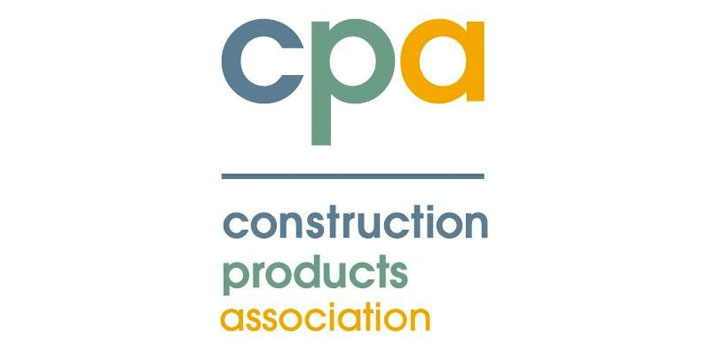
by Clair Mooney | Dec 6, 2019 | Main News Feed
The Markit/CIPS PMI for manufacturing was 48.9 in November, down from 49.6 in October. This marked the seventh consecutive month of contraction for the manufacturing sector, as the upcoming General Election added another layer of uncertainty, whilst destocking activity resumed following the delay to the October 31 Brexit deadline.
The Markit/CIPS PMI for construction was 45.3 in November, up from 44.2 in October. Although the latest reading was the highest since July, it remained below the no-change mark of 50, indicating that construction activity contracted for a seventh consecutive month, owing to a lack of new work to replace completed contracts and unusually wet weather in November.
Members can access the full CPA Weekly Notes via the link below.
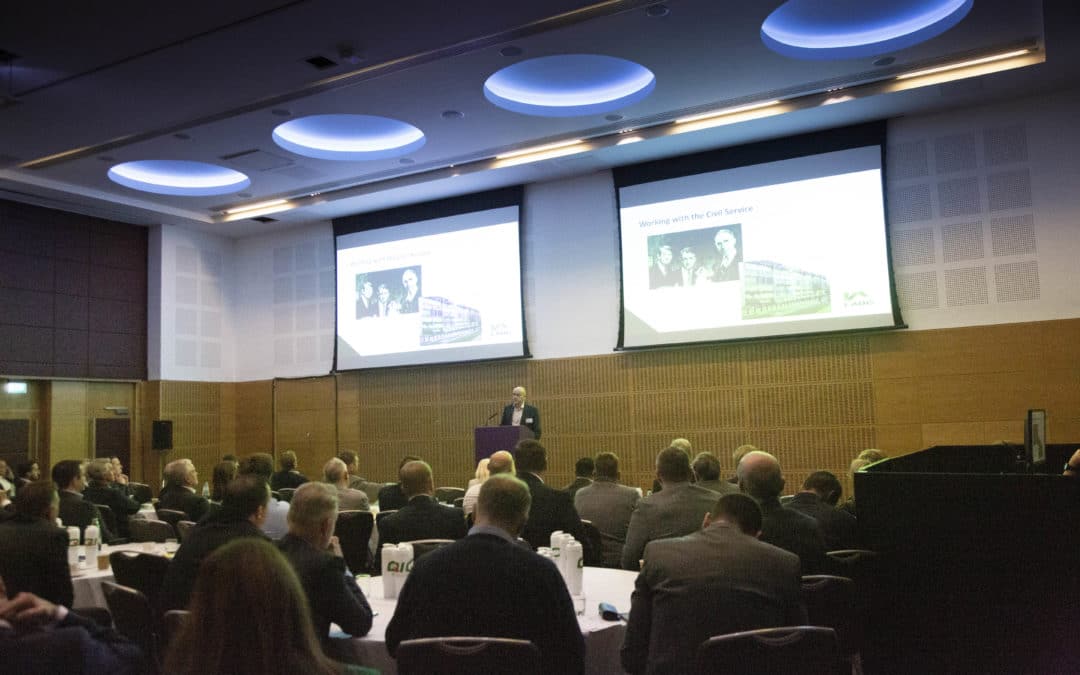
by Clair Mooney | Dec 6, 2019 | Main News Feed
Dr Noble Francis – Economics Director, Construction Products Association
Making sense of the UK economy
Key points:
- There has been economic growth since the referendum, driven by consumers rather than business investment
- For construction, the commercial sector remains the most negatively impacted by Brexit
- Dr Francis presented possible Brexit options and likely outcomes (see slides)
- He highlighted that the carbon economy and sustainability are rising up the political and economic agenda again
Click here to view slides
Martin Taylor – Director of Regulatory Policy, Local Authority Building Control
A new era of Fire Safety in Construction and the implication of changes drawn from the Hackitt Review on product selection, working practices and wider performance issues.
Key points:
- The focus on High Risk Residential Buildings has started, but there is more regulatory change to come
- Much of the discussion is focussing on new build, but control will extend to existing HRRB’s.
- A series of ‘gateway points’ are being incorporated into the building safety regime for high-rise residential buildings in England, requiring the responsible dutyholder to demonstrate compliance at set points during design and construction.
- Detailed work is starting on how to structure the Joint Regulator comprising of the HSE, Building Control and the Fire and Rescue Service.
- Skills shortages and resource constraints are a concern in the Building Control sector too.
Click here to view slides
Fergus Harradence, Deputy Director Construction, Department for Business, Energy and Industrial Strategy
Construction 2025 – a new Industrial Strategy – Payment, Competence, Quality and Safety – the view from Government.
Fergus highlighted the following risks/key impacts on construction from a socio-economic perspective
- Brexit – UK due to leave EU on the 31 January. Withdrawal Agreement, leaving without a WA and a further extension all possibilities. Ongoing uncertainty until after the General Election.
- Insurance – market tightening, especially for PI insurance. Premia increasing, excess levels increasing, and policies covering fewer activities. Driven by Grenfell and Carillion, and the perception that construction is high-risk.
- Building Safety – expect new legislation to be introduced to Parliament to implement the recommendations of the Hackitt Review.
- Reverse Charge VAT – introduction of this will be a challenge for the sector. Significant cash flow implications for firms in the subcontracting chain.
- Competition – series of CMA investigations into demolitions, groundworks, concrete pipework, fit-out contractors. More focus on the sector and a publicity campaign in 2020.
- Fair Payment – Fergus outlined that Government remained concerned about practice in the industry, some action had been taken, but more to be done.
Click here to view slides
Defect free construction, Martin Adie, MAC Construction
Productivity in construction is not improving, too much time is spent snagging and redoing. How do we move to defect free through quality management and a focus on product, process and people?
Key points:
- Martin provided some indicative figures on re-work rates in their business and roughly how much this may be costing
- He interrogated the key factors that impact quality in terms of People, The Environment, Cost and Time
- He used the new FIS PPP Quality Management Tool to help drive a PDCA Quality Assuurance Process (Plan Act Check Do)
- Finally he looked at definitions of competence and where to prioritise efforts
Click here to view slides
Wellbeing and your workforce, Nathan Shearman, Red Umbrella
Attacking the mental health challenge in construction. Red Umbrella looks at underlying issues and finding new ways to support our workforce.
Key points:
- 4 million days were lost due to mental health, 57% of all absenteeism is due to mental health and the estimated cost to UK employers is £33 – £42 billion per year
- 75% of all suicides are completed by men. Suicide is now the leading cause of death in men under 50.
- Males working in a skilled trade – including building finishing trades – are twice as likely to attempt suicide than the general population
- Nathan went on to interrogate some of the causes and how to develop a Mental Health and Work Plan.
Click here to view slides
The art of getting paid, David Rintoul, Partner, Clarkslegal
Late payment is a blight on construction, but final account settlement is about so much more. This session focussed on ensuring you get paid on time and manage those dreaded variations.
Key points:
- It is important to understand what is a variation and what it can cover (from a contractual perspective). David referenced key JCT clauses.
- David explored (using relevant case law) when a notice is a “condition precedent”
- He outlined what must be included in a variation notice
- David underpinned the significance of interim valuation dates and the reciprocal pay-less notices
- The session ended with an open discussion on common disputes
Click here to view slides
Communication in a changing world, David Ing, Managing Director, Fabrick
With a sector under scrutiny and going through major changes, managing brand reputation and communicating with customers has never been so important. With so many communication tools at your disposal and digital revolutionising the way we interact, what do companies need to do to drive effective brand communications?
Key points:
- David started to analyse the different channels that we have available (social media, digital, pr etc) and how to prioritise these
- He highlighted the importance of deep content, such as case studies, technical features, interviews, videos, blogs and viewpoints
- He went on to describe how to use content to engage, inform and ultimately influence
- David highlighted that crisis can happen and communication in crisis is critical, he provided some top tips to support this work
Click here to view slides
Building wellbeing into fit-out, Elina Grigoriou, Grigoriou Interiors
How the design of interior spaces impacts wellbeing. Analysing a variety of factors such as light, biophilia, indoor air quality and colour and the impact they are having on productivity in the UK.
Key points:
- Elina provided summary of her recently published book, Wellbeing in Interiors, Philosophy, Design and Value in Practice
- She highlighted that wellbeing is achieved when there is harmony between the people and the interior
- She provided insight into the 8 key pillars of wellbeing in a building
- Elina completed the presentation with a number of key case studies that embody the principles of wellbeing
Click here to view slides
Managing your risks, Gavin Dunn, CEO, CABE
Understanding your risks and the elusive Golden Thread is pivotal in a post Grenfell world. This workshop focussed on competency frameworks and how to ensure that we exchange the right information and manage relationships from design through to construction to reduce risk and improve safety and quality.
Key points:
- Gavin looked at some of the ground truths that underpin some of the current challenges that lay before our Industry. He interrogated the Building Safety Issues and highlighted that despite reports of skills issues, only 14% of the construction sector workforce and 11% from ethnic minorities.
- Gavin used the Oxgang School Case study to look at some of the quality failings
- He interrogated what The Golden Thread identified in the Hackett Report means and finally how CABE and the wider Construction Engineering Community are rethinking competence and the importance of CPD
Click here to view slides

by Clair Mooney | Nov 21, 2019 | Main News Feed
Match report: The Etex Fit-Out Cup, St George’s Park, 20 November 2019
A day now etched in footballing history started like any other November morning. It was a windy, crisp and bright autumn day at the England Training Ground as the two teams assembled for the inaugural Etex Fit-out Cup. The pitch was perfect, the army drafted in (seriously!) to act as match officials and the tension and excitement in the crowd (all 5 of them) was palpable.
It is hardly surprising that Etex started the brighter of the two teams. They arrived, looking the part, communicating well, forming passing triangles all over the park, controlling the ball and the play in the first 20 minutes. Was it that the core of the team made up from Building Materials Ltd and had clearly played together before, was it talent, youthful vigour or simply that half the FIS team had fallen out of the bar in the wee small hours and needed to sweat out some of that alcohol to see the game clearly?
Whatever it was Saminder Matharu, well supplied by James Bouvier and Matthew Davies looked a constant threat up front. Oscar Venus (who has all but ended a promising career at the FIS when he turned coat and volunteered to make up the numbers for the opposition) was starting gel with the lads from Building Materials Ltd and stretch the FIS midfield – FIS goalie, Alex Brown, did well to keep the score level controlling his box well. The sensible money was starting to swing towards the Red and Whites with mumbles of “could be a drubbing” heard from the crowd (already down to four!). But the FIS team started to gel and the defence kept shape (very much built around the 6ft 3 Centre Half Alex Wright who was solid in the air and in the tackle) and Minster’s Lee Cowling. The gaps started to disappear. The crowd (now swelled by substitutes in the form of Big Danny and Grahame from PWB) started to feed off the growing confidence on the pitch and comments like “this actually isn’t bad football” cut through the pessimism. Indeed FIS almost took the lead when Hammad Taj broke through to score, only to be pulled back for an earlier infringement by Etex (the atmosphere in the crowd soured as the lack of advantage seemed harsh).
Etex pressure and patience finally paid off though when Darren Young who had been having a stirling game marginally mistimed a tackle on the edge of the box and a penalty was calmly slotted home.
Their second goal quickly followed with a fast ball over the top being hammered home on the half volley, leaving Alex no hope at all. Things appeared to be unravelling when Darren Adams (Great Yarmouth Ceilings) who had been a stalwart throughout had to retire due to a thigh strain. But up steps Big Danny Fitzsimmons who not only filled his shirt, but held the ball up well, provided an intimidating presence and showed a deft touch that drew comments from the crowd like “neat feet for a big lad”. FIS needed to find some hope from somewhere, but few games have ever turned on a throw in – this one did. FIS could have finished the half with heads down, but a throw in just before half time revealed a new secret weapon. I have honestly never in 40 years of watching football seen a ball travel as far as Danny’s throw in – it may even be a defining moment for football, you can’t surely be held up for wasting time if it is because you were just waiting 5 mins for the ball to land! I am fully expecting Etex to get an order of Plasterboard from the FA to compliment their Gym Equipment if that it what slinging boards can do for a throw in in the modern game!
Half time came and Jay Lee (who had displayed an architects eye for design and shape as he had constantly found gaps with his neat passing) and Alex Jones swapped shirts with Jay switching to goal and Grahame from PWB taking to the field.
Team FIS picked up where they left off and with Michael Burke, Steve Williams (captain), and Angus Nanan combining neat passing with great control and energetic, solid defending to keep Etex under constant pressure and prevent the quick over the top ball causing FIS further trouble. Alex proved himself quickly as an outfield player with calm control and an ability to take players on. Gemma (the lone lady) continued to get stuck in and, like all good strikers, never gave anything up. Grahame Helm, the oldest player on the park proved that there was life in the old dog and used all his guile and experience to ensure that he was always in the right spot.
The swing in momentum finally gave just reward when some more passing gave Hammad a sight at the goal. Despite being 25 yards out, he didn’t need a formal invite to curl it into the top corner with a goal that would have beaten any keeper and been a contender for the goal of the week on Match of the Day.
FIS rolled subs on and off, but with 15 mins to go legs were tiring and they were running out of options. Reluctantly they were even forced to use FIS CEO Iain McIlwee who ably demonstrated why he was banished from the football field at the age of 11 and told to go and play “with a different shaped ball and the other fat lads over there!”
But despite Iain’s presence significantly weakening the FIS Team, there was another twist when a mazey run from Hammand Taj bought a soft foul in the box and another penalty was awarded and scored by Hammand.
Normal time finished 2 v 2 despite several close efforts from Etex and it could so easily been won by them, but for some brave goalkeeping from Jay.
With the final whistle gone, the two captains quickly consulted and, to spare an overload at the cardiac unit of the local hospital, decided that, extra time was high risk and penalties would be used to separate our teams. Even this proved difficult and after 10 penalties it was still 4 v 4 and sudden death. Then up step our two hero’s Gemma and Jay. Jay’s athletic save was quickly followed by Gemma calmly slotting home the winning penalty and team FIS finished the victors.
It really was a fantastic event, thanks to all involved. Special mentions to the two most valued players, Berkuk Kunduh of Building Materials and Hammad Taj of Kerry London and of course our sponsors Etex. The event raised £1,700 for our charity Mind and was a great reminder of how sport can have a positive impact on mental health.
If you are interested in getting involved in the Fit-Out Cup 2020, let us know.
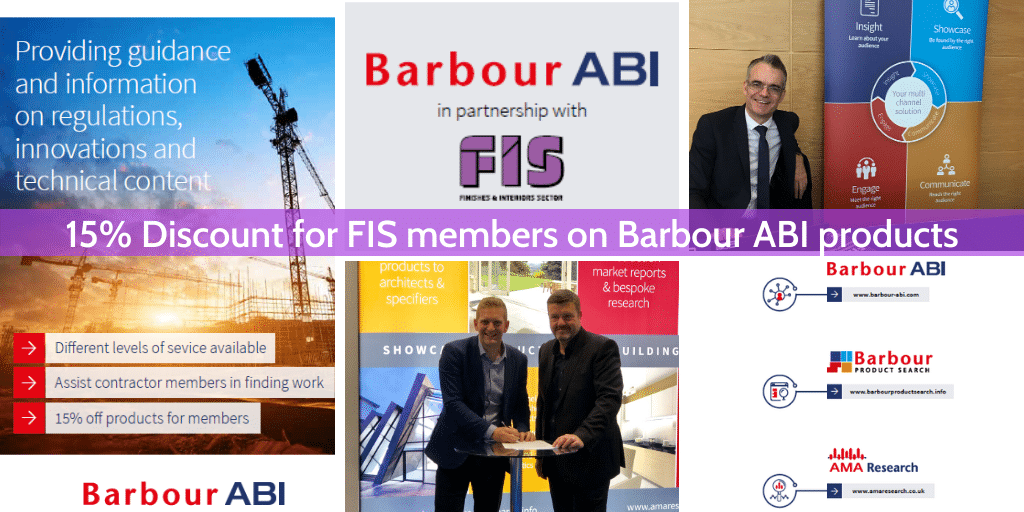
by Clair Mooney | Nov 21, 2019 | Main News Feed
FIS has partnered with Barbour ABI to extend our reach and educate and take our content directly to specifiers and building designers.
This partnership is great news for FIS members because it provides a dedicated Hub for FIS on the Barbour ABI Product Search where we will be able to:
- Deliver technical content and best practice advice directly to the specifer
- Highlight best practice within the membership and support members in bringing their products to the attention of this vital audience
- Showcase the work our members do such through our Awards
- Assist contractor members in finding work
- Receive 15% discount off any products within the Barbour ABI portfolio. FIS members can simply call 0151 353 3500 and quote code FIS to discuss further, for more information click here
To go to the FIS hub on Barbour Product Search click here

by Clair Mooney | Nov 21, 2019 | Main News Feed
Leeds College of Building is now offering the Interior Systems Installer Apprenticeship, focusing specifically on the drylining pathway. This is a Level 2 qualification and typically takes two years to complete.
Working in partnership with British Gypsum to deliver the course, it includes the supply of materials, training and keeping apprentices up-to-date with product development. If you are interested, get in touch with the Apprenticeship Team on 0113 222 6041 or email wbl@lcb.ac.uk
Key facts
Location of study: Leeds College of Building
Funding band: £14,000, non-levy employer contribution £700
What will the candidate Study: This course is based on the new Interior Systems Installer Apprenticeship Standard.
Apprentices start: Sept 2020, however early demand could bring the first wave forward to February 2020.
Apprenticeship Training Costs: If you are an apprenticeship levy-payer you could fund this course through your levy payments, and for non-levy payers you will be required to contribute 5% of the course cost. If you are a non-levy payer and have less than 50 employees and take on a 16-18 year old apprentice the course will be free. Regardless of whether you are a levy/non-levy paying company, you can claim a one-off incentive of £1,000 for taking on a 16-18 year old apprentice.
The college will also support apprentices from out of the area by accommodating them free of charge in a city centre hotel whilst they are in college and also help with the travel costs.
For full details click here.
With around 60,000 Dryliners active in the UK, Drylining must, as a trade be one of the UK’s best kept secrets. Everybody knows what a plasterer or a carpenter is, but you often get blank looks when you talk about drylining.
The fact is that drylining is now emerging as one of the key trades in construction. It is encouraging to see leading colleges like Leeds evidencing this by getting behind it. We now have a new Apprenticeship Standard, new providers and the new funding allows real flexibility about age of apprentices.
We are also seeing significant increases in the CITB funding available for companies who take on apprentices – this is over and above the funding that you can get to cover the training. This is a huge opportunity to make 2020 the year of the apprentice, for the sector to embrace this standard as a catalyst for change, to revisit how we invest in training and work with colleges and providers to put drylining firmly on the careers map
CEO, Finishes and Interios Sector (FIS)

by Clair Mooney | Nov 21, 2019 | Main News Feed
The retention policies of major public sector clients has been published by Build UK as it reached its latest milestone on its Roadmap to Zero Retentions. The information aims to provide increased transparency for the industry and includes the retention percentage generally inserted in contracts between the client and its Tier 1 contractors, as well as when the money should be released. There are significant complexities in the various policies, including exceptions that exist for certain types of project, and details can be found here.

by Clair Mooney | Nov 21, 2019 | Main News Feed
The Construction Industry Advisory Committee (CONIAC) is looking for individuals to join its Supporting Small Employers working group.
The Health and Safety Executive is supported by a range of advisory committees and industry groups. These bodies may be concerned with health and safety in a particular industry or sector or with particular hazards present across a range of industry sectors. One such group is the Construction Industry Advisory Committee.
If you have a passion for improving the health, safety and wellbeing performance of the construction industry; work for a small/medium company and think you could make a difference and are willing to try; then you could be the person CONIAC is looking for.
Small and medium sized construction companies face particular health, safety and wellbeing (HS&W) challenges. The Supporting Small Employers Working Group (SSE WG) is tasked with both understanding these challenges and for proposing ways by which small companies can better manage HS&W risks faced by their workers.
To help further the work of the SSE WG individuals are being sought who would be willing to participate in the work of this group. The WG will benefit from hearing first-hand experience of the challenges small companies are facing and how those challenges are being met. The expectation is to attend four meetings a year and to undertake the reading and preparation required for these meetings; meetings are generally held in central London.
To get more information and to express and interest please contact one of the following Working Group members
GrenTipper grentipper@hotmail.com
Ade Ige Adebayo.ige@hse.gov.uk
Kevin Fear kevin.fear@citb.co.uk

by Clair Mooney | Oct 9, 2019 | Main News Feed
With the support of CITB, FIS has relaunched the flagship Fit-out-Futures programme targeting a more consistent and effective approach to attracting and introducing new starters into the finishes and interiors sector. Changes to the programme enable FIS to extend the successful BuildBack project (which has over the past 18 months given induction training and employment opportunities to over 800 individuals who were previously long-term unemployed), using the principles and learnings to support key target demographics:
- Young people not in education, employment or training
- Unemployed
- Ex-military service leavers
- Full-time learners (particularly those studying for construction and built environment diplomas).
- We are also interested in those people retraining in construction.
There are two key elements to this work. A structured assessment and induction programme for finding and embedding new starters and a clear work-experience framework that supports employers in finding and managing work trials, connecting employers with college learners. The programme is also looking at addressing diversity across the key target groups.
FIS CEO, Iain McIlwee stated, “Fit-out-Futures focuses on the way we attract and induct people, it is built on the principle that if we start people right we will reduce what is now a quite horrific waste of time and resources invested in training. In interrogating where people start and how they flow through our industry, there are clear areas of waste. The fact that, whilst we recognise we have a skills shortage, almost 70% of students currently studying a construction related course in college will never work in the industry is mind-blowing. We also know that if we don’t assess and induct people effectively, we end up wasting time and money training people who have no future in our sector.
We learned a lot through BuildBack and in working with our Approved Training Providers in phase one of Fit-out-Futures, but it became ever clearer that to put a real dent in overcoming our skills shortage we need marginal gain across all groups entering our sector. This project will help to integrate a more consistent induction for new starters to the broadest cross-section of new starters, so they get a better feel for the industry they are joining and have clearer understanding of competency requirements and opportunities. Through Fit-out-Futures we are also interrogating what attracts and turns people off when it comes to the way we introduce them to the finishes and interiors sector, we want to understand where we get it wrong so we want to do it better.
Another key part of the project is how we engage with colleges, we all allowed this vital relationship to slip away and now colleges often feel apart from rather than a part of our sector. We have engrained relationships with FE Colleges and other key training providers into Fit-out Futures to ensure that we understand the issues from all angles”
FIS are now calling for employers, trainers and assessors to get involved. Collaboration and partnership are at the heart of the FIS strategy. FIS is well placed and open to developing key relationships across main contractors, housebuilders, local authorities and agencies providing the basis for excellent reputation across all areas of the industry. In delivering Fit-out Futures Version 2 FIS will manage and deliver all strands and options end to end working with all parties, delivering a seamless experience and making it as easy as possible for employers to take on new entrants and for new entrants to get skilled and employed.
Fit-out-Futures is a critical part of the wider FIS Competency SAKE work, where we continue to work to support our sector in raising levels of competency and attacking skills shortages within the sector.
To find out more about how you can benefit from Fit-out Futures visit our website at:
www.thefis.org/skills-hub/fit-out-futures/ or email us at skills@thefis.org

by Clair Mooney | Apr 3, 2019 | Main News Feed
ISG’s turnover jumped from £1.71bn to £2.24 in 2018, a significant jump of more than £500m in one year.
The main factors behind the increase were more work from the public sector; expanding in the small to medium fit-out market and increased work in continental Europe.
Chief executive Paul Cossell welcomed the growth but told Construction News it was not his company’s main focus. “We try not to talk about turnover growth, which has been the sector’s norm. We’re really interested in margin and cash growth”.
“There is no pressure to chase volume or to do anything that brings cash flow in,” he added.
Pre-tax profit for ISG tripled from £9.1m in 2017 to £27.4m for the year ending 31 December 2018, according to its accounts, with the corresponding margin increasing from 0.5 per cent to 1.2 per cent.
Mr Cossell said the margin for 2018 was “okay” and the company expected to do better in 2019. “We will be disappointed if we don’t break the 2 per cent barrier in 2019,” he said.
The company has a margin target of 4 per cent by 2024.
All five of ISG’s operating areas reported increases in revenue for 2018 with four of them also reporting increases in underlying pre-tax profit.
UK construction, the second largest division after UK fit-out, was the only operation to falter. Profit slipped from £6.8m to £5.7m while revenue increased from £480m to £520.2m.
Mr Cossell said 2018 was a transitional year for the UK construction business, which was the last division in ISG to be “modernised”.
Management has been overhauled, with Interserve’s former construction managing director Gordon Kew taking over as chief operating officer and Steven McGee coming in as new MD for the South.
The business has also started to win projects larger than the sub-£100m jobs that ISG was known for, Mr Cossell said.
Over the past year the firm secured four jobs in £200m-£400m range and another £300m-plus job in London is in the pipeline for 2019.
“It’s all for selected clients in targeted sectors,” Mr Cossell added. “It’s not growth for growth’s sake.”
Aside from public sector work won mainly through frameworks, ISG construction is focused on the higher education, hospitality and leisure, office, residential build-to-rent and the industrial market, especially distribution centres and warehouses.
Mr Cossell said the construction business’s order book was “pretty full” and that “2019 will be okay, but 2020 is going to be very good” for the business.
With the construction business overhauled, the ISG group was now capable of delivering up to £3bn of work a year, but Mr Cossell said it would ideally be less than that.
“£2.5bn [annual revenue] feels like the natural level, but that can flex down or up,” he added.
“We would like to think [for 2019] it’ll be around £2.5bn with a 2 per cent margin.”
To manage the growth the company is on a hiring spree and expects to recruit somewhere in the region of 600 to 700 new people this year.
“From a talent acquisition point of view we’ve certainly seen more good people in the marketplace that we think helps us, so we’re receptive to talent that wants to come to a different business,” Mr Cossell said.
Source: Construction News

by Clair Mooney | Mar 29, 2019 | Main News Feed
FIS is a proud partner of the Inspiring Change Conference and members are encouraged to enter the Inspiring Change Awards which highlight and reward organisations within the sector that have created more inclusive cultures in their workplaces, education, and the community.
The Conference itself will bring together a range of inspirational industry-wide speakers, including politicians, industry stakeholders and representatives from a wide range of sectors.
The conference will take place on Tuesday 21 May 2019 from 10.00-16.30 at No 11 Cavendish Square, London, W1G 0AN.
The event is free to attend and will share client expectations and good practice from within the construction industry and beyond to advance the understanding of the business and societal benefits of developing a culture of fairness, inclusion and respect within the workplace. Attendees will be able to network with 300 like-minded professionals.
For more information about the conference, how to enter the awards and take advantage of award sponsorship opportunities visit the website at: www.inspiringchangeawards.com or email Brionywickenden@ceca.co.uk
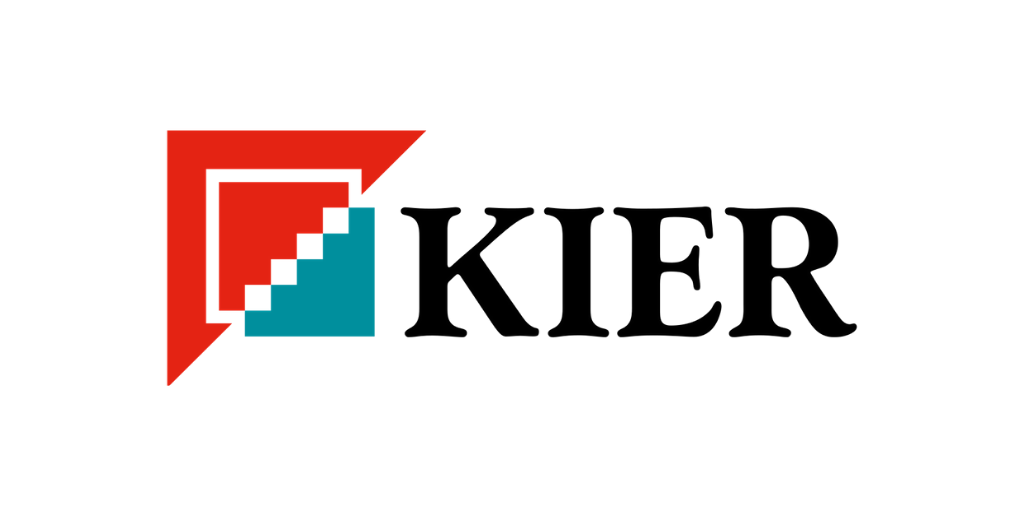
by Clair Mooney | Mar 29, 2019 | Main News Feed
The controversial new plan forms part of its new Working as One initiative. This has been designed to overhaul and promote better supply chain relationships across the group.
Kier says it is revamping its supply chain approach to encourage greater collaboration and alignment with subcontractors.
But some subcontractors claim it is the latest twist in a developing pay to get paid culture as main contractors seek to strengthen balance sheets as clients shy away from large upfront payments on jobs.
Kier has called meetings with large groups of subcontractors at its London office to explain the new banded structure before the system is piloted in the south east.
Subcontractors were told to keep the plan under wraps although the Enquirer has been told the new deal for highest ranked strategic subcontractors will involve the new 1.5% ‘management fee’ alongside the promise of more repeat work.
A subcontractor said: “We saw this sort of thing with Carillion – main contractor discounts, rebates. Now we are being asked for 1.5% just to work with them.
“The danger is what Kier is doing becomes contagious and other main contractors sit up and say we need to do this.”
Over 14,000 suppliers and contractors ranging from Tier 1 to micro SMEs work with Kier, with subcontractors alone accounting for £2.4bn of spending each year.
Under the new arrangement, subcontractors and suppliers will be split into four relationship bands. The lowest is a new entrant level where the onus is on communicating expected standards.
Firms at the “approved” level will be pre-qualified to Kier standards, be involved in training and upskilling with tender opportunities highlighted across the group.
Preferred contractors will have proven track records on projects and use the Kier Early Payment System, which allows payment days to be reduced to 21 days for a fee.
While the system is a voluntary one, it has grown steadily in use and ran at an average debt level of £196m in last six months of last year.
Firms moving to the highest strategic band will be expected to come into greater alignment.
Kier hopes this will involve greater innovation sharing, early work pipeline discussions and agreed standards terms and conditions.
A Kier spokesperson said “We are continuously developing new ways of working with our supply chain. Following feedback from our supply chain partners, we are investing in smarter solutions on a collaborative, voluntary basis.
“Working with larger strategic subcontractors, we are looking to reduce overall project delivery costs within our buildings businesses. This early project engagement with our subcontractors offers them preferred trading terms and the opportunity to develop project improvements.
“We anticipate this will improve the overall value of project delivery for our clients.”
Source: Construction Enquirer
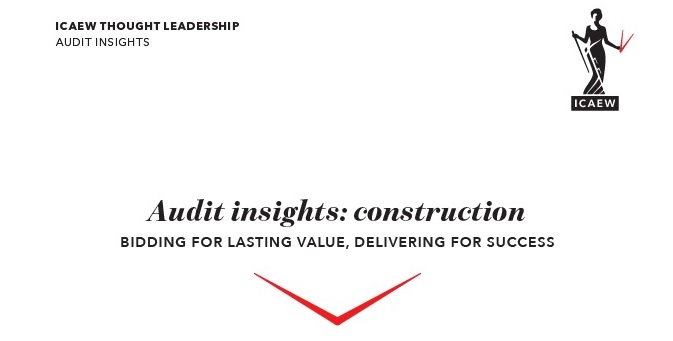
by Clair Mooney | Mar 29, 2019 | Main News Feed
When construction companies and clients get it right – through project selection based on their ability to deliver, responsible tendering, diligent monitoring, and a proactive attitude to deal with issues such as cost and timetable overruns – they create contracts that are more profitable and provide more enduring value to society.
The challenge facing the construction sector is that, regardless of the economic climate, contracting can be precarious. The lethal cocktail of low margins and high risks means even the largest firms can find themselves just a few contracts away from slipping into the red. This pressure is further compounded by the longest decline in bank lending for construction companies since 2011 – because of fears of a downturn in the economy and the impact of Brexit – at a time when firms need to manage their debt.
Against this difficult background, our Audit insights report examines four key areas that need to be addressed by construction firms if they are to run sound, well-managed businesses:
- bidding for lasting value;
- delivering for success;
- rebuilding confidence through increased transparency; and
- getting fit for the future.
This report brings together the expert insights of auditors with many years’ experience of independently examining and auditing construction firms from: BDO, Deloitte, EY, Grant Thornton, KPMG, Mazars, The Orange Partnership, PwC and RSM

by Clair Mooney | Mar 26, 2019 | Main News Feed

by Clair Mooney | Mar 25, 2019 | Main News Feed
FIS and the Steel Construction Institute (SCI) will launch the much-awaited Technical Report ED017 – Design and Installation of Light Steel External Wall Systems guide with a consortium of industry partners on Thursday 16 May.
SFS is the lightweight steel frame used to create the inner leaf of an external wall, it’s been around for over 20 years but its benefits are just being realised, which is why so many projects are using it, but there are problems being created because of a lack of planning and knowledge. It’s the first thing you see, but often the last thing that’s designed in a building, and that’s the issue.
SFS is seen as non-load bearing, not holding the structure up but it is supporting cladding, internal linings, insulation and perhaps even services. There are significant implications should it fail, which could lead to the external cladding falling off.
Who is the guide aimed at and why should they use it?
- The guide is for anyone who designs and installs SFS infill walls
- Anyone checking that the products are being correctly installed, such as a ‘Clerk of Works’.
- It will help to raise standards
- Show clients what SFS is and how it works
- It will get people thinking about what is expected of them, the design and the final installation
- It will give installers the confidence to question designs and provide guidance to ensure the installation is as good as it can be
- The document includes checklists as well as guidance that makes people stop and check that all the information that should be provided, is provided.
As the landscape post-Grenfell develops, we envisage that it will be very different from the way in which buildings are being designed and constructed now, this guide will become the go to reference for all involved.
Book your place at the SFS guide launch now, it will allow you engage with industry experts in this specialised area and network with other professionals.



















